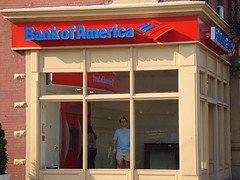Bank Of America Explains Why It Never Assumed Title To Squatter-Filled Foreclosure

(meg)
According to a statement from the bank, BofA could not complete the foreclosure process on this particular home because the homeowner filed for bankruptcy in 2010.
“As a result, title to the property remains in his name as the file has continued to show that the property is in an active bankruptcy proceeding,” explains the bank, which points out that collection activities are restricted during bankruptcy proceedings.
And while the homeowner seemed surprised in the CBS San Francisco story to learn that he still owned the property that he’d claimed was lost to foreclosure around two years ago, a rep for BofA says that the bank has had “several conversations” with him in which it was explained “that he still owns the property and is in the strongest legal position to ask authorities to evict the squatters.”
“[The homeowner] had been made aware last fall that in order to resolve his concerns, we would need information that the property was no longer part of an active bankruptcy,” writes BofA, which says it finally received this notification in December 2012. Since then, the bank claims to have been working with the former homeowner and the mortgage owner to “expedite an acceptable liquidation of the mortgage that would lead to transfer of the title from his name.”
The bank says that the homeowner recently agreed to a deed-in-lieu (DIL) transaction, in which he would transfer the home over to the mortgage-owner rather than go through the standard foreclosure process, but that the investor holding the mortgage on the property did not initially go along with that proposal.
“Bank of America’s representative has reactivated the DIL file and continues to work toward that possible end or another acceptable liquidation solution that will transfer title,” explains a bank rep.
As for the squatters, who the homeowner says have done hundreds of thousands of dollars in damage to the home, BofA says it is not legally responsible for maintaining a property it does not have title to. However, the bank claims it had spoken with the city attorney regarding the squatters and “agreed to have our property preservation contractor secure the property once police carried out an eviction.”
The bank says it confirmed the house was vacant on Feb. 14. However, CBS San Francisco reported that squatters had subsequently returned to the property.
“We hadn’t been told that squatters may have reoccupied the property last week until we read the KPIX transcript yesterday,” says BofA. “We asked our property preservation vendor to send someone in the late afternoon to check to see if there has been another break-in at the property. We remain in the same legal position as we were in on February 14: If there are trespassers there, we’ll need police assistance to evict them before the bank and property preservation vendor will have any legal standing to re-secure the property. Plans were already in process to install additional security later this week.”
The ultimate lesson of this story is that foreclosures and bankruptcies can be incredibly complicated and are not to be entered into lightly. As we mentioned yesterday, banks are not always rushing to foreclose on a house just because the homeowner stops paying the mortgage or abandons the property. And if the bank doesn’t get around to taking over the title in a timely manner, that homeowner is still on the hook for anything that happens on or to the property in the interim.
Want more consumer news? Visit our parent organization, Consumer Reports, for the latest on scams, recalls, and other consumer issues.

